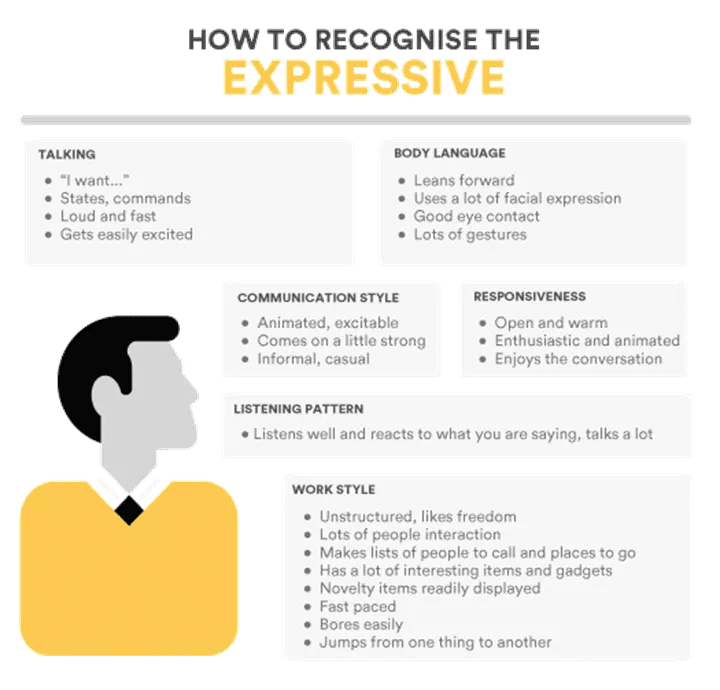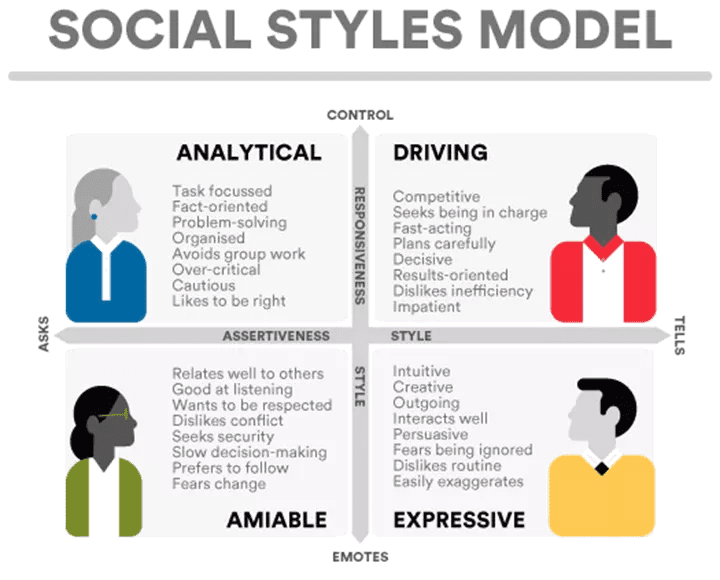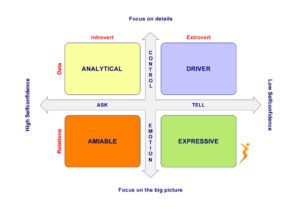
What is the Expressive Personality Type?
The Expressive Social Personality Type is High in both Assertiveness and Responsiveness. Expressive people are Articulate, Visionary, Creative, Enthusiastic, Spontaneous, Persuasive, and great Motivators.
Expressive Personality Type Cross-reference
- Keirsey Type – Idealists
- Temperament Type – Phlegmatic
- Animal Type – Otter
- DISC Type – Influential
- True Colors – Blue
- Color Code – Blue
- Personality Compass – West
- Occupational Type – Artistic
- Learning Type – Theorist
- Leadership Type – Collaborator
MBTI Personality Types (xNFx) – Intuition and Feeling
Enneagram Types
- Type 1 – The Reformer (ENFJ, INFJ)
- Type 4 – The Individualist (INFJ, INFP)
- Type 7 – The Enthusiast (ENFP)
- Type 9 – The Peacemaker (INFP)
What are the 4 Social Personality Types?
There are four behavioral-focused Social Personality Types based on your level of Assertiveness and Responsiveness. It’s your personality that’s on display!
In the early 1960s, two industrial psychologists, David Merrill and Roger Reid, wanted to understand whether they could predict managerial, leadership, and sales performance. To do this, they explored how people behaved in social situations and chose not to concern themselves with why.
Merrill and Reid started with BF Skinner’s ideas of behaviorism and James Taylor’s structured list of behavioral descriptions, and they discovered that people’s behavior follows along two continua, which they labeled Assertiveness and Responsiveness.
Assertiveness Style
The Assertiveness Style ranges from asking behaviors to telling behaviors, while the Responsiveness Style varies from emoting or displaying our feelings to controlling our emotions.
Assertive people can initiate, maintain, and terminate conversations skillfully. They are competitive, dominant, forceful, and independent.
Responsiveness Style
Responsive people are others-oriented, meaning they listen to others and show a general concern for their success. They are helpful, compassionate, friendly, sincere, and considerate of others’ feelings.
An individual’s level of Assertiveness and Responsiveness determines their Social Style.

Learn more about the 4 Social Personality Types.
The Expressive Personality Type
Traits
- Articulate
- Visionary
- Creative
- Enthusiastic
- Spontaneous
- Persuader
- Motivator
Motivation
- Challenges and Acknowledgement
Under-stress
- May become sarcastic, then approve.
Expressive Type Communication Styles
- Please make an effort to be interested and support their vision and intuition.
- Try to be enthusiastic, responsive, and willing to talk.
- Be prepared to answer “Who” type questions.
When the Expressive communicates with an Analytical
Relate to your imaginative, stimulating, and thought-provoking nature.
Question your ability to perform as stated, your follow-through, and your loud, flashy, emotional
side.
Working with this Style will require you to exercise your versatility.
- Talk about facts, not opinions, and break down the parts, preferably in writing.
- Back up your points with proof from authoritative sources.
- Be quietly patient while they discover for themselves what you already know.
When the Expressive communicates with an Amiable
Relate to your warmth, enthusiasm, and stimulating and personable nature.
Question your outgoing, loud, dramatic, and impulsive sides.
- Slow down the pace and volume; allow time to build a relationship.
- Work on one item at a time, in detail; avoid the confusion of too many tasks or ideas at one time.
- Encourage suggestions, participation in team activities, and supportive roles.
When the Expressive communicates with a Driver
Relate to your outgoing, imaginative, competitive, and personable aspects.
Question your “rah-rah,” demonstrative, impulsive, emotional side.
- Back up your enthusiasm with actual results; demonstrate that your ideas work.
- Be on time and keep within agreed-on limits; provide materials promptly.
- Provide action choices whenever possible and let the drivers select the action.
When the Expressive communicates with another Expressive
Perceive you as outgoing, enthusiastic, warm, opinionated, talkative, intuitive, emotional,
stimulating, imaginative, impulsive, excitable, loud, flashy, dramatic, personable, competitive, and
caring.
Provide discipline in this relationship, or all the fun and creativity may accomplish nothing. Instead, keep on track and emphasize the basics, allowing carefully limited experimentation as a reward for results.
Expressive Type Action Plan
| Expressive Characteristics | So You |
|---|---|
| They are concerned with approval and appearances. | Show them that you admire and like them. |
| They seek enthusiastic people and situations. | Behave optimistically and provide an upbeat setting. |
| They think emotionally. | Support their feelings when possible. |
| They want to know the general expectations. | Avoid involved details, and focus on the “big picture.” |
| They need involvement and people contact. | Interact and participate with them. |
| They like changes and innovations. | Vary the routine; avoid requiring long-term repetition by them. |
| They want others to notice them. | Compliment them personally and often. |
| They need help getting organized. | Do it together. |
| They dislike conflict. | Act non-aggressively and avoid arguing directly on a personal basis. |
| They look for action and stimulation. | Keep up a fast, lively pace. |
| They surround themselves with optimism. | Support their ideas, and don’t poke holes in their dreams; show them your positive side. |
| They want feedback that they “look good.” | Mention their accomplishments, progress, and your other genuine appreciation. |
Portrait of an Expressive Office
In short, it’s a mess. The Expressive loves favorite sayings and has them plastered on the wall or sitting on the desk.
Files are never in a filing cabinet. Instead, they’re piled all over the office in stacks. But don’t be misled. The Expressive knows where everything is and can find virtually anything by location.
Office colors will probably be loud and lively. Unfortunately, if there are flowers or plants, they’re likely dead – either talked to death or lacking water.
The Expressive’s greatest reward is personal acknowledgment from others with examples on display.
The Expressive is an excitable dreamer with many ideas and projects without the time to
follow.

